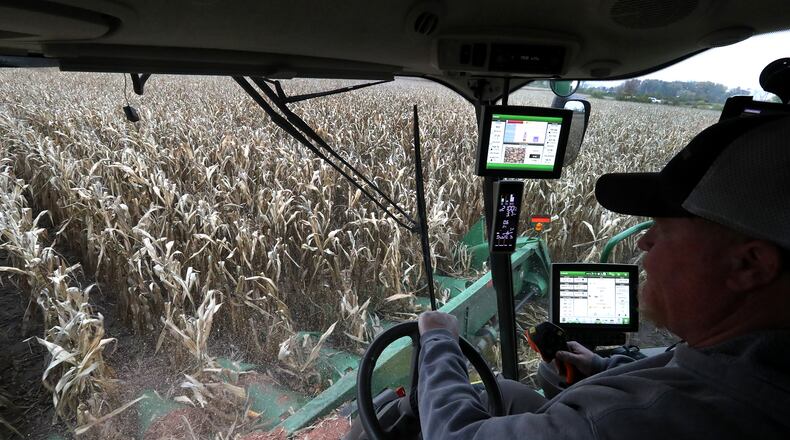There are four major issues Ohio farmers are thinking about this presidential election: taxes, trade, biofuel and farm labor.
Which issue matters most to a farmer can depend on their industry and the size of their farm, among other factors.
Ben Brown, a professor of agriculture at Ohio State University, said farmers he’s spoken with are most concerned about biofuels if Trump wins and taxes if Biden wins.
Stuart Young, the farm manager for Young’s Jersey Dairy in Clark County, said those in the agriculture industry are use to frequently adapting to changing economic times as well as policies.
“No matter who wins the presidency, we will figure it out. Tell us what the rules are and we will figure out how to play by them,” Young said.
Trade
Clark County farmer Brian Harbage said that free trade is an important part of agriculture and he added that the more “we are fighting with other countries, the more difficult that trade becomes.”
He said it is important for the country’s leadership to reach doable and manageable agreements on the international stage that does not hinder the exportation of certain crops to other countries.
Harbage said he grows corn, soybeans and wheat.
Taxes
Tax policy can have an outsized effect on farmers because they often bring in a large income that is offset by large expenses, resulting in small take-home pay. Estate taxes can also become obstacles to farm succession, at times requiring tax payments on the value of farm operations valued at more than $11 million before they can be transferred to children. Taxes are often the issue most important to farmers, “no matter what” the candidate’s other agriculture-related policies are, Brown said.
Harbage said it’s important to be able to pass farms down in the family. In some cases families may have to sell some of the land that they inherit due to not being able to afford it if taxes are too high, he said.
Brown said “death taxes” on land and assets due at time of transfer can be “killer” for a lot of family farms.
The Trump administration’s tax cuts included a provision for a step-up in basis, essentially a benefit that reduces large capital gain taxes for inheritors.
If Biden is elected, Brown expects to see farmers hurrying to transfer assets to their children before the new president can sign a bill repealing step-up in basis.
Reversing what Trump did during his presidency, Biden also plans to increase taxes on corporations and anybody earning over $400,000.
“In agriculture, we deal with very large sums, so we tend to trigger those (taxes) fairly quickly but then we have the big expenses,” Brown said.
Brown said many Ohio farmers “are scared of what a Biden administration will do to their farm.”
Farm Labor
Ohioans involved in the dairy and some other agricultural industries said they need legal migrant labor to meet their needs.
Scott Higgins, CEO of the Ohio Dairy Producers Association, said it’s difficult to find American workers who want to work with cows.
“There are folks from other countries coming here that really love cows and working with cows so we need to make sure we have an immigration program that allows them to come ... and do it legally,” Higgins said.
Trump has made cracking down on immigration a pillar of his platform. However, when Trump issued an executive order in June suspending some temporary work visas that he said “present a risk to the U.S. labor market following the coronavirus outbreak,” he did not suspend H2-A visas, the kind used by temporary farm laborers.
Biden has expressed support for the Farm Workforce Modernization Act, a bill that could reform and expand the H-2A visa program and provide a path to legal residency to undocumented farmworkers. The latter issue is a nonstarter for some Republicans, which is why it has passed the House (attracting 23 Republican votes) but has not been brought up in the Senate.
Young said the H-2A visa program is vital for some farmers, especially those that have larger produce and dairy operations.
“It is super important to have a well functioning program that brings people in legally to do that work,” he said, stating that it is key to creating a reliable workforce in the agriculture industry.
Biofuel
Brad Reynolds, the director of communications for Ohio Corn & Wheat, said maintaining and increasing demand for ethanol fuel is “vitally important” to Ohio corn farmers.
There are federal rules requiring fuel sold in the U.S. to contain a minimum volume of renewable fuel, such as ethanol. The Trump administration roughly quadrupled the number of exemptions granted to oil and gas companies from those requirements. In January, the Tenth Circuit Court of Appeals struck down some of those exemptions.
In September, Trump’s EPA denied more than 50 retroactive waivers from the ethanol mandate requests. Farm and biofuel advocates have since urged the administration to do more to support biofuel, including releasing the renewable fuel requirements for 2021, which are normally set between June and September.
According to the Biden campaign website, Biden’s plan for rural America includes “promoting biofuels.” However, Brown said Biden’s campaign appears focused on supporting the advancement of electric vehicles.
Harbage said that for some farmers who grow corn, a lot of their operation is dependent on the conversion of those corps to ethanol. If that demand changes, that could have consequences for those farmers, he added.


